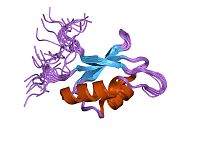
Photo from wikipedia
BackgroundTranscriptional elongation is a generic function, but is also regulated to allow rapid transcription responses. Following relatively long initiation and promoter clearance, RNA polymerase II can pause and then rapidly… Click to show full abstract
BackgroundTranscriptional elongation is a generic function, but is also regulated to allow rapid transcription responses. Following relatively long initiation and promoter clearance, RNA polymerase II can pause and then rapidly elongate following recruitment of positive elongation factors. Multiple elongation complexes exist, but the role of specific components in adult Drosophila is underexplored.ResultsWe conducted RNA-seq experiments to analyze the effect of RNAi knockdown of Suppressor of Triplolethal and lilliputian. We similarly analyzed the effect of expressing a dominant negative Cyclin-dependent kinase 9 allele. We observed that almost half of the genes expressed in adults showed reduced expression, supporting a broad role for the three tested genes in steady-state transcript abundance. Expression profiles following lilliputian and Suppressor of Triplolethal RNAi were nearly identical raising the possibility that they are obligatory co-factors. Genes showing reduced expression due to these RNAi treatments were short and enriched for genes encoding metabolic or enzymatic functions. The dominant-negative Cyclin-dependent kinase 9 profiles showed both overlapping and specific differential expression, suggesting involvement in multiple complexes. We also observed hundreds of genes with sex-biased differential expression following treatment.ConclusionTranscriptional profiles suggest that Lilliputian and Suppressor of Triplolethal are obligatory cofactors in the adult and that they can also function with Cyclin-dependent kinase 9 at a subset of loci. Our results suggest that transcriptional elongation control is especially important for rapidly expressed genes to support digestion and metabolism, many of which have sex-biased function.
Journal Title: BMC Genomics
Year Published: 2017
Link to full text (if available)
Share on Social Media: Sign Up to like & get
recommendations!